Unit 7 Will people have robots? 单元测试(含答案)2024-2025学年人教版英语八年级上册
文档属性
| 名称 | Unit 7 Will people have robots? 单元测试(含答案)2024-2025学年人教版英语八年级上册 |
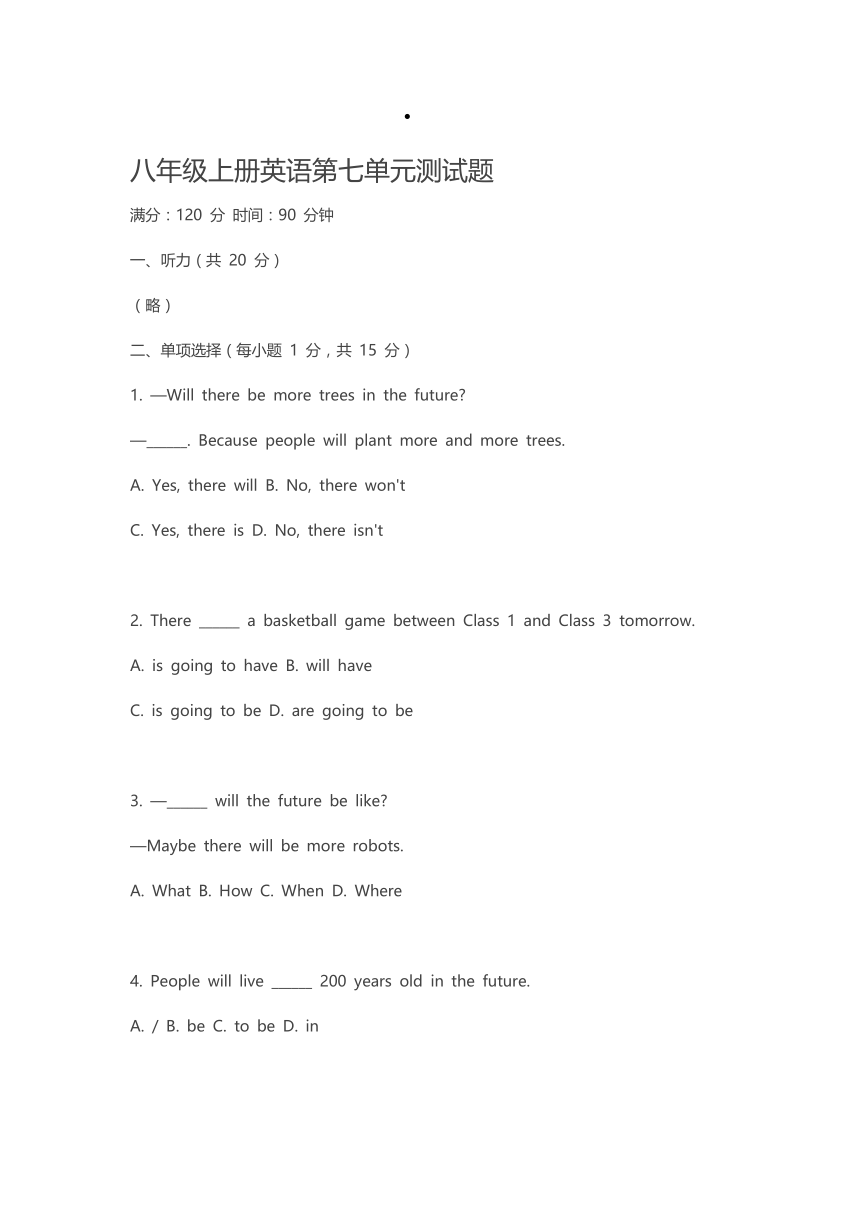
|
|
| 格式 | docx | ||
| 文件大小 | 22.9KB | ||
| 资源类型 | 教案 | ||
| 版本资源 | 人教新目标(Go for it)版 | ||
| 科目 | 英语 | ||
| 更新时间 | 2025-01-03 00:00:00 | ||
图片预览

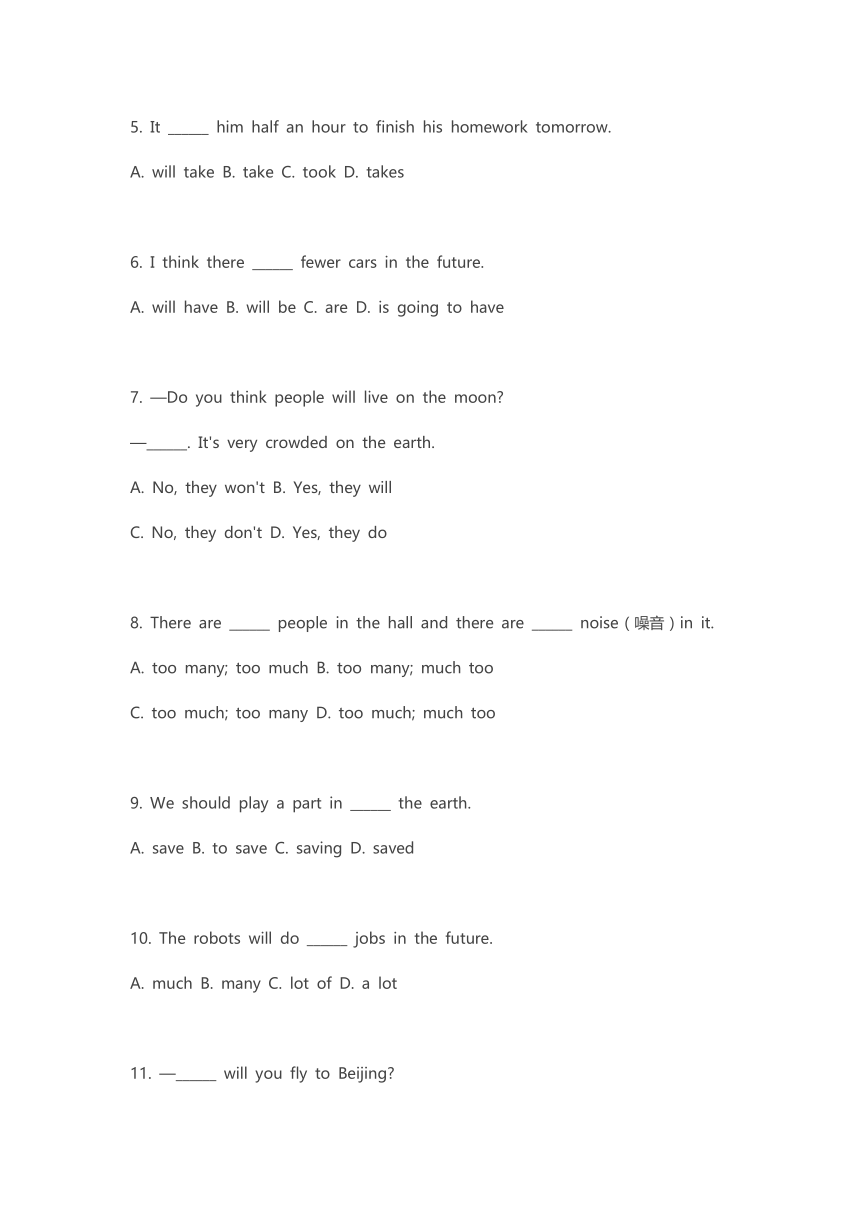
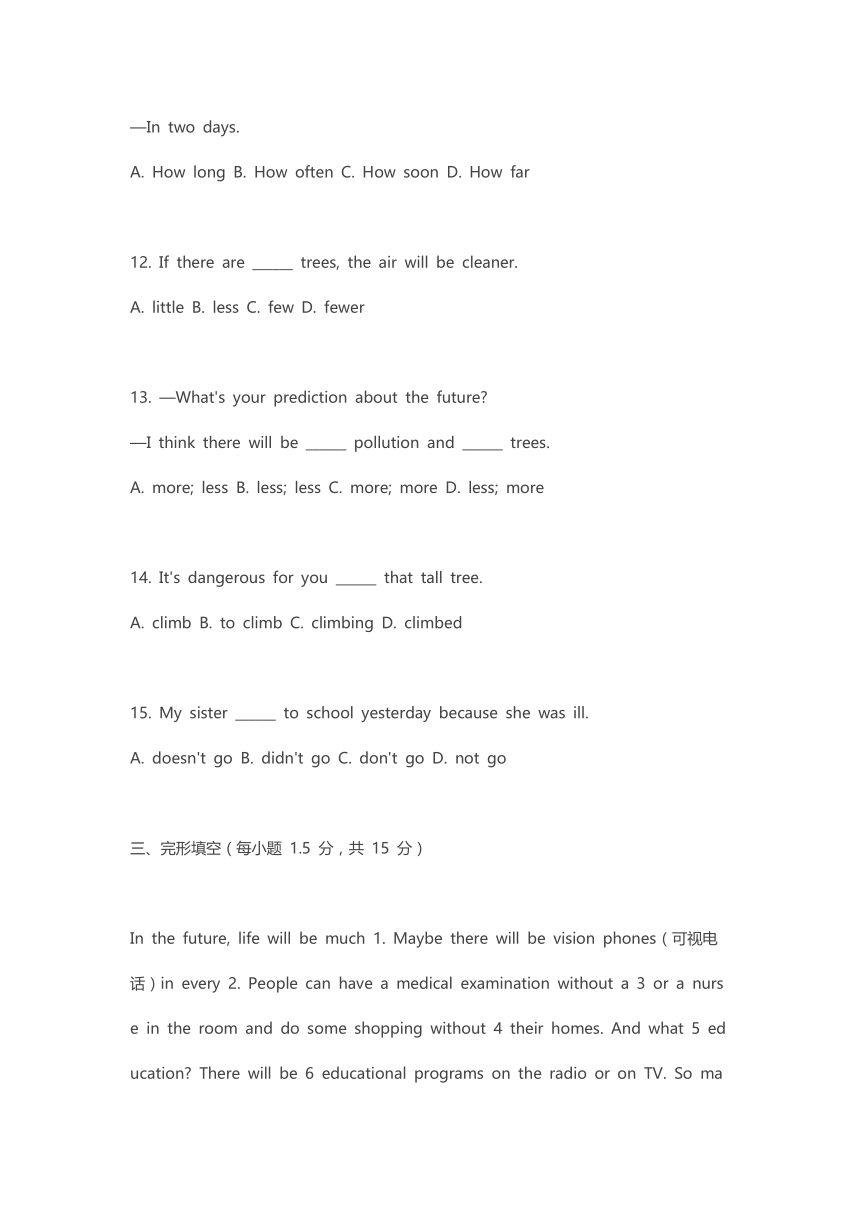
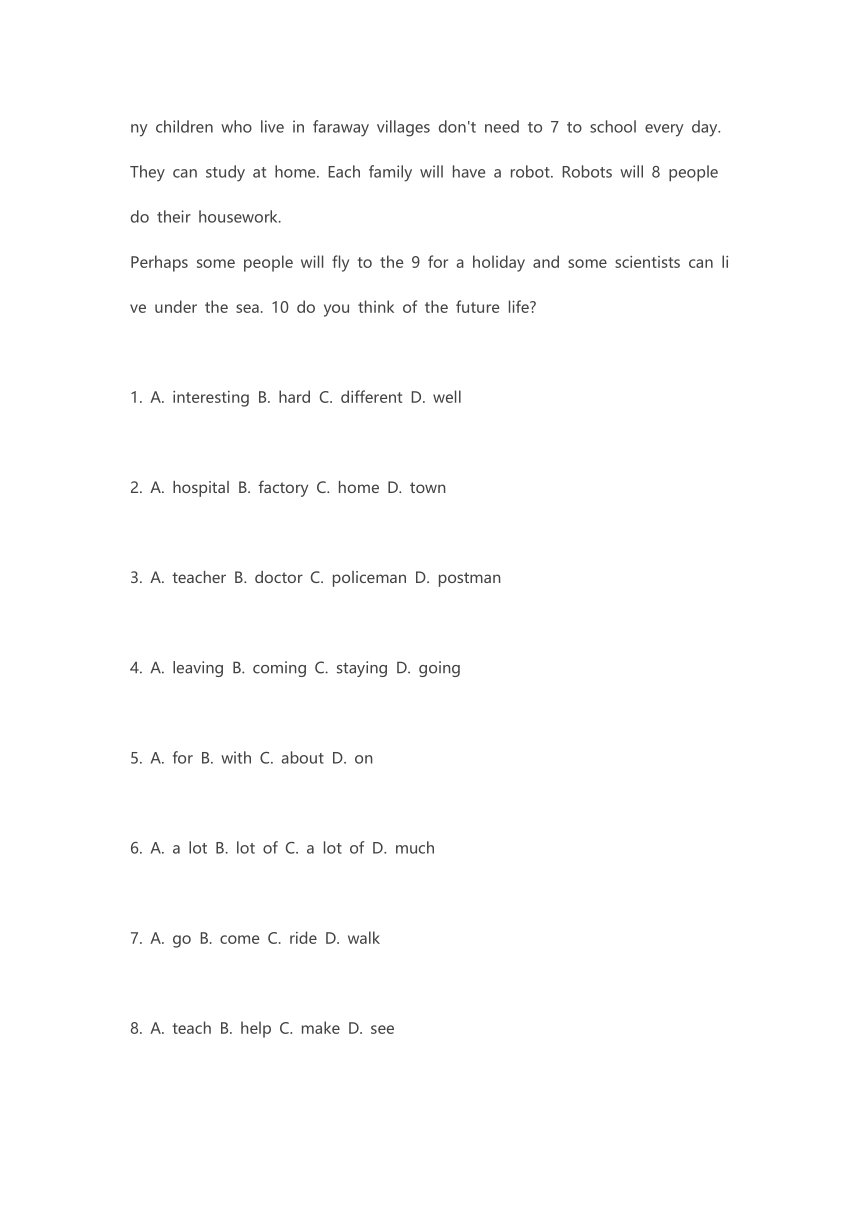
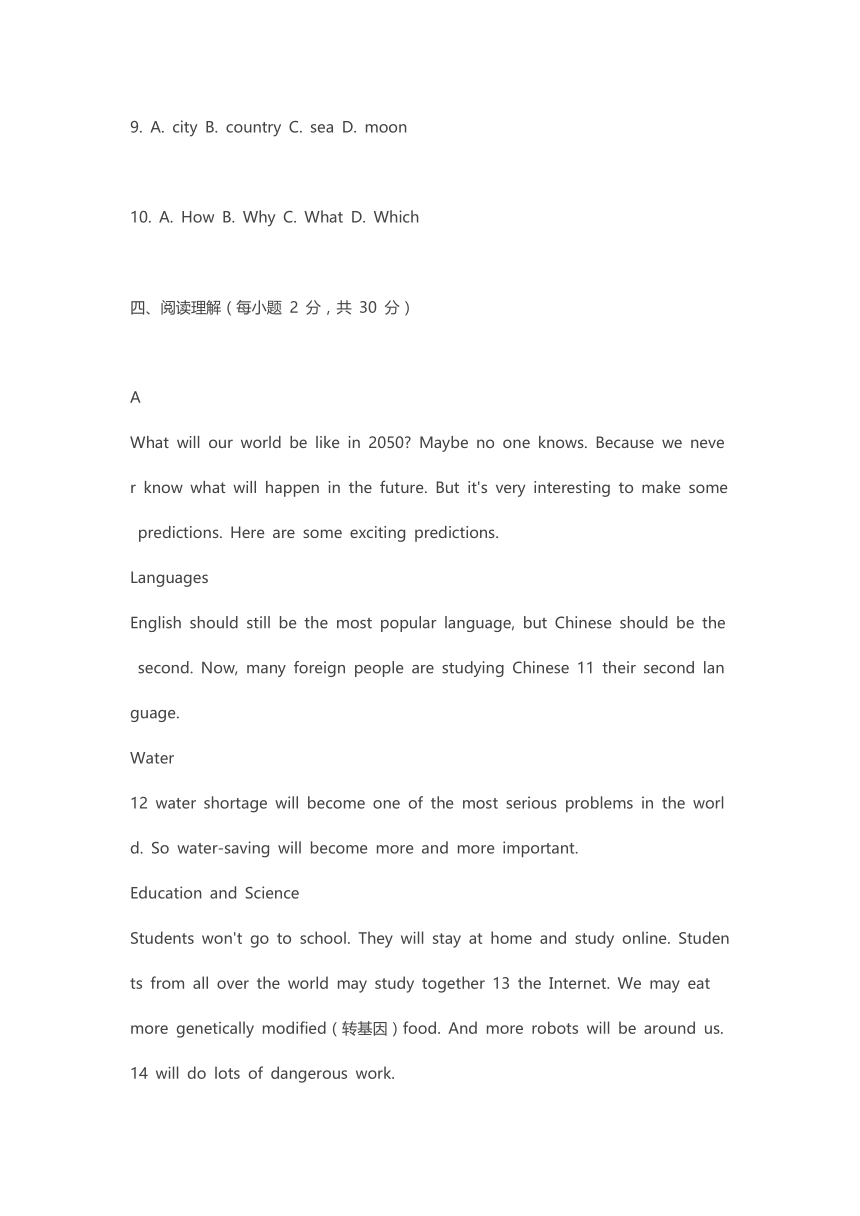
文档简介
八年级上册英语第七单元测试题
满分:120 分 时间:90 分钟
一、听力(共 20 分)
(略)
二、单项选择(每小题 1 分,共 15 分)
1. —Will there be more trees in the future
—______. Because people will plant more and more trees.
A. Yes, there will B. No, there won't
C. Yes, there is D. No, there isn't
2. There ______ a basketball game between Class 1 and Class 3 tomorrow.
A. is going to have B. will have
C. is going to be D. are going to be
3. —______ will the future be like
—Maybe there will be more robots.
A. What B. How C. When D. Where
4. People will live ______ 200 years old in the future.
A. / B. be C. to be D. in
5. It ______ him half an hour to finish his homework tomorrow.
A. will take B. take C. took D. takes
6. I think there ______ fewer cars in the future.
A. will have B. will be C. are D. is going to have
7. —Do you think people will live on the moon
—______. It's very crowded on the earth.
A. No, they won't B. Yes, they will
C. No, they don't D. Yes, they do
8. There are ______ people in the hall and there are ______ noise(噪音)in it.
A. too many; too much B. too many; much too
C. too much; too many D. too much; much too
9. We should play a part in ______ the earth.
A. save B. to save C. saving D. saved
10. The robots will do ______ jobs in the future.
A. much B. many C. lot of D. a lot
11. —______ will you fly to Beijing
—In two days.
A. How long B. How often C. How soon D. How far
12. If there are ______ trees, the air will be cleaner.
A. little B. less C. few D. fewer
13. —What's your prediction about the future
—I think there will be ______ pollution and ______ trees.
A. more; less B. less; less C. more; more D. less; more
14. It's dangerous for you ______ that tall tree.
A. climb B. to climb C. climbing D. climbed
15. My sister ______ to school yesterday because she was ill.
A. doesn't go B. didn't go C. don't go D. not go
三、完形填空(每小题 1.5 分,共 15 分)
In the future, life will be much 1. Maybe there will be vision phones(可视电话)in every 2. People can have a medical examination without a 3 or a nurse in the room and do some shopping without 4 their homes. And what 5 education There will be 6 educational programs on the radio or on TV. So many children who live in faraway villages don't need to 7 to school every day. They can study at home. Each family will have a robot. Robots will 8 people do their housework.
Perhaps some people will fly to the 9 for a holiday and some scientists can live under the sea. 10 do you think of the future life
1. A. interesting B. hard C. different D. well
2. A. hospital B. factory C. home D. town
3. A. teacher B. doctor C. policeman D. postman
4. A. leaving B. coming C. staying D. going
5. A. for B. with C. about D. on
6. A. a lot B. lot of C. a lot of D. much
7. A. go B. come C. ride D. walk
8. A. teach B. help C. make D. see
9. A. city B. country C. sea D. moon
10. A. How B. Why C. What D. Which
四、阅读理解(每小题 2 分,共 30 分)
A
What will our world be like in 2050 Maybe no one knows. Because we never know what will happen in the future. But it's very interesting to make some predictions. Here are some exciting predictions.
Languages
English should still be the most popular language, but Chinese should be the second. Now, many foreign people are studying Chinese 11 their second language.
Water
12 water shortage will become one of the most serious problems in the world. So water-saving will become more and more important.
Education and Science
Students won't go to school. They will stay at home and study online. Students from all over the world may study together 13 the Internet. We may eat more genetically modified(转基因)food. And more robots will be around us. 14 will do lots of dangerous work.
Living
People will live and work under the sea. Perhaps there will be big towns, factories and farms under the sea, too. Everyone will carry a pocket computer. The computer will give people all the answers 15 their questions. Everyone will have telephones in the pockets, too, and they will be able to talk to their friends all over the world.
1. There are ______ kinds of predictions in the passage.
A. three B. four C. five D. six
2. The underlined word “shortage” in the passage means “______” in Chinese.
A. 短缺 B. 丰富 C. 清澈 D. 浑浊
3. Which is TRUE according to the passage
A. Chinese will be the most popular language.
B. Students will go to school in 2050.
C. People will live and work under the sea.
D. There will be no water problems in 2050.
4. What's the passage mainly about
A. The life in the future.
B. The school life in the future.
C. The language in the future.
D. The food in the future.
B
In the future, more and more people will move to big cities. To prepare for this, cities are becoming smarter and more efficient, with the help of big data(数据).
The local governments(当地政府)collect lots of data. For example, there are sensors(传感器)that measure noise, pollution and traffic. This is known as “smart city technology”. In the future, this data will make our lives much easier, by helping us save energy and keep the city tidy. There might even be smart posts that can clean the air, or robots that empty rubbish bins when they are full.
Such technologies may be far off in the future, but others are just around the corner: self-driving cars are today being tested all around the world. Experts believe that this technology will change what cities look like. If self-driving taxis can use smart city data to find the best way to take you to your destination(目的地), there will be fewer traffic jams and more space for you to walk or ride a bike. People will probably stop buying cars altogether.
Smart city technology will also bring many other benefits(益处). For example, if water sensors find a water leak(泄露)in the pipes, the problem can be fixed right away, without your having to call the repairman.
Of course, it will take time and money to turn our present cities into the smart cities of the future. But it won't be long until more cities join the smart city revolution(革命).
5. Why are the sensors mentioned in the second paragraph
A. To show that cities are becoming much smarter.
B. To explain what “smart city technology” is.
C. To help people in cities live a more exciting life.
D. To describe the changes that will happen in the future.
6. What is the third paragraph mainly about
A. How self-driving cars work.
B. Why self-driving cars are popular.
C. The advantages of self-driving cars.
D. The future of self-driving cars.
7. What does the underlined word “them” in the third paragraph refer to
A. Self-driving taxis. B. Traffic jams.
C. Smart city data. D. Rubbish bins.
8. What can we learn from the passage
A. Smart city technology is being widely used now.
B. People will have to pay less money to live in a smart city.
C. More and more cities are becoming “smarter” and more efficient.
D. It will be very difficult to turn our present cities into smart cities.
C
What will the house of the future look like Could it have gardens on its walls, or a pool with fish for dinner Architects(建筑师)believe that they are all possible. The only thing for sure is that the houses will be as green as possible.
The tree house
Many architects in the world would like to build a “tree house”. Like a leaf, the surface of the house collects sunlight during the day. The energy can be used to heat water, produce electricity, and even create fresh air for the home. The “root”(根)of the house is deep under the ground. It uses the soil(土壤)to control the home's temperature.
The lizard(蜥蜴)house
Like a lizard, changing color with the weather is the most important design of a lizard house. When it's in the bright sun, the cover of the house will turn dark to protect it from strong heat. During dark days, it turns white and takes in as much light and heat as possible to produce energy.
Meals at home
This design is perhaps as much about the future of food production as architecture(建筑风格). It has gardens on the outside wall of the house. People can plant tomatoes, carrots and green tea on them. So every day in the morning, you just need to walk outside and collect your meals.
Learning from the past
Looking to the future isn't the only way to be green. Sometimes, ancient techniques(古老的技术)can also help cut down energy use. For example, a chimney(烟囱)can be a useful air conditioner because it is easier for hot air to flow out of the chimney.
9. What is the best title of the passage
A. Green Houses of the Future
B. The Greener, the Better
C. How to Build Green Houses
D. Changes of the Houses
10. We can heat water, produce electricity or create fresh air for the home ______.
A. with the root of a leaf B. with the energy from sunlight
C. with the soil under the ground D. with gardens on its walls
11. What will happen to the cover of the lizard house when it's in the bright sun
A. It will take in light.
B. It will turn dark.
C. It will turn white.
D. It will produce energy.
12. The passage seems to tell us that meals at home in the future ______.
A. will be more delicious
B. need more cooks
C. will be greener
D. will be easy to cook
五、词汇运用(每小题 1 分,共 10 分)
A)根据句意及首字母提示完成单词。
1. Maybe people will live on the moon in the f______.
2. The e______ is our home. We should take good care of it.
3. There will be more robots in the f______. They can do many things for people.
4. I think there will be more p______ in 100 years.
5. People will have more free time because robots will help them do the j______.
B)用所给词的适当形式填空。
6. There ______(be)a basketball game between Class 1 and Class 3 tomorrow.
7. They ______(not have)any classes next week.
8. I think cities will be very big and ______(crowd)in the future.
9. We can do the work with ______(little)money and ______(few)people than they can.
10. Maybe people will have their own ______(plane)in the future.
六、书面表达(20 分)
以“Life in the Future”为题,写一篇 80 词左右的英语短文,可适当发挥想象,描述未来人们的生活,如居住环境、交通方式、工作、学习等方面的变化。
参考词汇:in the future, live in, transportation, work, study
参考答案:
一、听力(略)
二、单项选择
1-5 ACA CA 6-10 BBACB 11-15 CDDBB
三、完形填空
1-5 CCBAC 6-10 CABDC
四、阅读理解
1-4 BACA 5-8 BCCC 9-12 ABBC
五、词汇运用
A)1. future 2. earth 3. future 4. pollution 5. jobs
B)6. will be 7. won't have 8. crowded 9. less; fewer 10. planes
六、书面表达
Life in the Future
In the future, people's lives will be very different. People will live in houses under the sea or on other planets. There will be new types of transportation, like flying cars. People won't need to go to work or school every day. They can work and study at home through the Internet. Robots will do most of the housework and heavy jobs. With the development of technology, life in the future will be more comfortable and convenient.
满分:120 分 时间:90 分钟
一、听力(共 20 分)
(略)
二、单项选择(每小题 1 分,共 15 分)
1. —Will there be more trees in the future
—______. Because people will plant more and more trees.
A. Yes, there will B. No, there won't
C. Yes, there is D. No, there isn't
2. There ______ a basketball game between Class 1 and Class 3 tomorrow.
A. is going to have B. will have
C. is going to be D. are going to be
3. —______ will the future be like
—Maybe there will be more robots.
A. What B. How C. When D. Where
4. People will live ______ 200 years old in the future.
A. / B. be C. to be D. in
5. It ______ him half an hour to finish his homework tomorrow.
A. will take B. take C. took D. takes
6. I think there ______ fewer cars in the future.
A. will have B. will be C. are D. is going to have
7. —Do you think people will live on the moon
—______. It's very crowded on the earth.
A. No, they won't B. Yes, they will
C. No, they don't D. Yes, they do
8. There are ______ people in the hall and there are ______ noise(噪音)in it.
A. too many; too much B. too many; much too
C. too much; too many D. too much; much too
9. We should play a part in ______ the earth.
A. save B. to save C. saving D. saved
10. The robots will do ______ jobs in the future.
A. much B. many C. lot of D. a lot
11. —______ will you fly to Beijing
—In two days.
A. How long B. How often C. How soon D. How far
12. If there are ______ trees, the air will be cleaner.
A. little B. less C. few D. fewer
13. —What's your prediction about the future
—I think there will be ______ pollution and ______ trees.
A. more; less B. less; less C. more; more D. less; more
14. It's dangerous for you ______ that tall tree.
A. climb B. to climb C. climbing D. climbed
15. My sister ______ to school yesterday because she was ill.
A. doesn't go B. didn't go C. don't go D. not go
三、完形填空(每小题 1.5 分,共 15 分)
In the future, life will be much 1. Maybe there will be vision phones(可视电话)in every 2. People can have a medical examination without a 3 or a nurse in the room and do some shopping without 4 their homes. And what 5 education There will be 6 educational programs on the radio or on TV. So many children who live in faraway villages don't need to 7 to school every day. They can study at home. Each family will have a robot. Robots will 8 people do their housework.
Perhaps some people will fly to the 9 for a holiday and some scientists can live under the sea. 10 do you think of the future life
1. A. interesting B. hard C. different D. well
2. A. hospital B. factory C. home D. town
3. A. teacher B. doctor C. policeman D. postman
4. A. leaving B. coming C. staying D. going
5. A. for B. with C. about D. on
6. A. a lot B. lot of C. a lot of D. much
7. A. go B. come C. ride D. walk
8. A. teach B. help C. make D. see
9. A. city B. country C. sea D. moon
10. A. How B. Why C. What D. Which
四、阅读理解(每小题 2 分,共 30 分)
A
What will our world be like in 2050 Maybe no one knows. Because we never know what will happen in the future. But it's very interesting to make some predictions. Here are some exciting predictions.
Languages
English should still be the most popular language, but Chinese should be the second. Now, many foreign people are studying Chinese 11 their second language.
Water
12 water shortage will become one of the most serious problems in the world. So water-saving will become more and more important.
Education and Science
Students won't go to school. They will stay at home and study online. Students from all over the world may study together 13 the Internet. We may eat more genetically modified(转基因)food. And more robots will be around us. 14 will do lots of dangerous work.
Living
People will live and work under the sea. Perhaps there will be big towns, factories and farms under the sea, too. Everyone will carry a pocket computer. The computer will give people all the answers 15 their questions. Everyone will have telephones in the pockets, too, and they will be able to talk to their friends all over the world.
1. There are ______ kinds of predictions in the passage.
A. three B. four C. five D. six
2. The underlined word “shortage” in the passage means “______” in Chinese.
A. 短缺 B. 丰富 C. 清澈 D. 浑浊
3. Which is TRUE according to the passage
A. Chinese will be the most popular language.
B. Students will go to school in 2050.
C. People will live and work under the sea.
D. There will be no water problems in 2050.
4. What's the passage mainly about
A. The life in the future.
B. The school life in the future.
C. The language in the future.
D. The food in the future.
B
In the future, more and more people will move to big cities. To prepare for this, cities are becoming smarter and more efficient, with the help of big data(数据).
The local governments(当地政府)collect lots of data. For example, there are sensors(传感器)that measure noise, pollution and traffic. This is known as “smart city technology”. In the future, this data will make our lives much easier, by helping us save energy and keep the city tidy. There might even be smart posts that can clean the air, or robots that empty rubbish bins when they are full.
Such technologies may be far off in the future, but others are just around the corner: self-driving cars are today being tested all around the world. Experts believe that this technology will change what cities look like. If self-driving taxis can use smart city data to find the best way to take you to your destination(目的地), there will be fewer traffic jams and more space for you to walk or ride a bike. People will probably stop buying cars altogether.
Smart city technology will also bring many other benefits(益处). For example, if water sensors find a water leak(泄露)in the pipes, the problem can be fixed right away, without your having to call the repairman.
Of course, it will take time and money to turn our present cities into the smart cities of the future. But it won't be long until more cities join the smart city revolution(革命).
5. Why are the sensors mentioned in the second paragraph
A. To show that cities are becoming much smarter.
B. To explain what “smart city technology” is.
C. To help people in cities live a more exciting life.
D. To describe the changes that will happen in the future.
6. What is the third paragraph mainly about
A. How self-driving cars work.
B. Why self-driving cars are popular.
C. The advantages of self-driving cars.
D. The future of self-driving cars.
7. What does the underlined word “them” in the third paragraph refer to
A. Self-driving taxis. B. Traffic jams.
C. Smart city data. D. Rubbish bins.
8. What can we learn from the passage
A. Smart city technology is being widely used now.
B. People will have to pay less money to live in a smart city.
C. More and more cities are becoming “smarter” and more efficient.
D. It will be very difficult to turn our present cities into smart cities.
C
What will the house of the future look like Could it have gardens on its walls, or a pool with fish for dinner Architects(建筑师)believe that they are all possible. The only thing for sure is that the houses will be as green as possible.
The tree house
Many architects in the world would like to build a “tree house”. Like a leaf, the surface of the house collects sunlight during the day. The energy can be used to heat water, produce electricity, and even create fresh air for the home. The “root”(根)of the house is deep under the ground. It uses the soil(土壤)to control the home's temperature.
The lizard(蜥蜴)house
Like a lizard, changing color with the weather is the most important design of a lizard house. When it's in the bright sun, the cover of the house will turn dark to protect it from strong heat. During dark days, it turns white and takes in as much light and heat as possible to produce energy.
Meals at home
This design is perhaps as much about the future of food production as architecture(建筑风格). It has gardens on the outside wall of the house. People can plant tomatoes, carrots and green tea on them. So every day in the morning, you just need to walk outside and collect your meals.
Learning from the past
Looking to the future isn't the only way to be green. Sometimes, ancient techniques(古老的技术)can also help cut down energy use. For example, a chimney(烟囱)can be a useful air conditioner because it is easier for hot air to flow out of the chimney.
9. What is the best title of the passage
A. Green Houses of the Future
B. The Greener, the Better
C. How to Build Green Houses
D. Changes of the Houses
10. We can heat water, produce electricity or create fresh air for the home ______.
A. with the root of a leaf B. with the energy from sunlight
C. with the soil under the ground D. with gardens on its walls
11. What will happen to the cover of the lizard house when it's in the bright sun
A. It will take in light.
B. It will turn dark.
C. It will turn white.
D. It will produce energy.
12. The passage seems to tell us that meals at home in the future ______.
A. will be more delicious
B. need more cooks
C. will be greener
D. will be easy to cook
五、词汇运用(每小题 1 分,共 10 分)
A)根据句意及首字母提示完成单词。
1. Maybe people will live on the moon in the f______.
2. The e______ is our home. We should take good care of it.
3. There will be more robots in the f______. They can do many things for people.
4. I think there will be more p______ in 100 years.
5. People will have more free time because robots will help them do the j______.
B)用所给词的适当形式填空。
6. There ______(be)a basketball game between Class 1 and Class 3 tomorrow.
7. They ______(not have)any classes next week.
8. I think cities will be very big and ______(crowd)in the future.
9. We can do the work with ______(little)money and ______(few)people than they can.
10. Maybe people will have their own ______(plane)in the future.
六、书面表达(20 分)
以“Life in the Future”为题,写一篇 80 词左右的英语短文,可适当发挥想象,描述未来人们的生活,如居住环境、交通方式、工作、学习等方面的变化。
参考词汇:in the future, live in, transportation, work, study
参考答案:
一、听力(略)
二、单项选择
1-5 ACA CA 6-10 BBACB 11-15 CDDBB
三、完形填空
1-5 CCBAC 6-10 CABDC
四、阅读理解
1-4 BACA 5-8 BCCC 9-12 ABBC
五、词汇运用
A)1. future 2. earth 3. future 4. pollution 5. jobs
B)6. will be 7. won't have 8. crowded 9. less; fewer 10. planes
六、书面表达
Life in the Future
In the future, people's lives will be very different. People will live in houses under the sea or on other planets. There will be new types of transportation, like flying cars. People won't need to go to work or school every day. They can work and study at home through the Internet. Robots will do most of the housework and heavy jobs. With the development of technology, life in the future will be more comfortable and convenient.
同课章节目录
- Unit 1 Where did you go on vacation?
- Section A
- Section B
- Unit 2 How often do you exercise?
- Section A
- Section B
- Unit 3 I'm more outgoing than my sister.
- Section A
- Section B
- Unit 4 What's the best movie theater?
- Section A
- Section B
- Unit 5 Do you want to watch a game show?
- Section A
- Section B
- Unit 6 I'm going to study computer science.
- Section A
- Section B
- Unit 7 Will people have robots?
- Section A
- Section B
- Unit 8 How do you make a banana milk shake?
- Section A
- Section B
- Unit 9 Can you come to my party?
- Section A
- Section B
- Unit 10 If you go to the party, you'll have a grea
- Section A
- Section B
